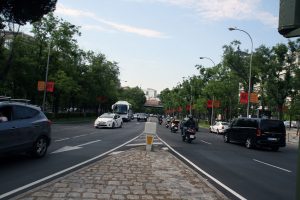
PHOTO BY TERRI CHU/GLEANER NEWS: Cars rule the road in Madrid (above), a city whose culinary delights and historic sights are marred by the population’s refusal to use public transit.
Time to end the car era
By Terri Chu
While I grant you that visiting a place for a mere two days can’t possibly do it justice, I was more than happy to leave Madrid after what felt like a very long 48 hours. Despite great cuisine and historic vistas, the city felt destroyed by its accommodation of cars.
Encountering traffic when coming in from the airport at 9 a.m., we asked our taxi driver if we were running into rush hour. No, he exclaimed, explaining that it was far too late for that, it was simply normal traffic. He added that a family of four typically has four cars, and spoke of the love affair this city has with driving despite the number of transit lines.
Traffic in and out of stations seemed light for a weekday compared to downtown stations in Toronto. Sure enough, for a city slightly larger than Toronto (3.1 million compared to Toronto’s 2.7), Madrid’s daily ridership is around 1.5 million compared to roughly 2.8 million in Toronto.
“Sadly, what was once no doubt a lovely city is so overwhelmed by pollution I couldn’t wait to leave.”
For a historic city, we noted that a lot of money was sunk into car infrastructure. There are car overpasses in districts that include castles and churches dating back hundreds of years. The costs involved must have been enormous. A walk along the beautiful, tree-lined boulevard quickly became unbearable as the smog made breathing difficult for someone with asthma. One can only guess how the trees manage to survive. Indeed, pollution was so bad last December that Madrid banned half of the cars from the city by alternating odd and even licence plates.
The city is tackling the problem. The day we arrived was the first day of a four-euro-per-hour parking tax. It was difficult to tell how much of an impact the tax had, but we certainly didn’t see a lot of empty parking spots. The love of driving was clear. When you build a city to accommodate cars, sure enough, they will come. Sadly, what was once no doubt a lovely city is so overwhelmed by pollution I couldn’t wait to leave.
As Toronto’s own transit debate rages on, the biggest lesson we can learn from Madrid is that a carrot itself is not enough. Opponents of tolled roads argue that you can’t unjustly penalize car drivers without giving them viable alternatives (like better transit). The existing “better transit” in Madrid shows that behaviours won’t change unless you penalize.
Toronto’s utter failure has been its horrific transit decision-making over the last four decades. The Sheppard Stubway to nowhere is still a financial disaster while the single stop to Scarborough is guaranteed to bleed money for longer than the Montreal Olympics.
Meanwhile, the 401 has been widened repeatedly yet traffic is as terrible as ever. It takes nearly three hours to drive to London now whereas when I first moved to Toronto, it was a reliable two-hour trek home. My dad recently said there were grumblings about a GO train to Toronto from London when he first bought the house 35 years ago when the bulk of the 401 was a mere two lanes in each direction.
We now have three to six lanes in each direction and more congestion than there ever was in the 90s. The population has increased substantially, and we have condemned newcomers to Canada to embracing the car lifestyle by not providing affordable transit options.
If Toronto were a young city, I’d advocate for building subway access to where there are no people yet and let the city fill in around it. However, in a city with 2.8 million people and 6 million in the surrounding area, the majority of whom are already under served by transit, the priority needs to be to get existing people off the road. Give people options and then penalize heavily for car traffic. Let’s not build a single stop subway when an LRT can serve many more people. Let’s start tolling the roads and substantially increase parking costs.
Madrid shows us how even a gorgeous historic city can be destroyed by traffic. If you accommodate cars, they will drive. We don’t need a return to smog days. The car era is over, and politicians need to start catching up.
Terri Chu is an engineer committed to practical environmentalism. This column is dedicated to helping the community reduce energy, and help distinguish environmental truths from myths.
READ MORE GREENINGS BY TERRI CHU:
Thoughts on hitting the 400 benchmark (May 2017)
Solving the food waste problem (April 2017)
Kellie Leitch was right (March 2017)
Feeling the carbon tax crunch? (January 2017)
